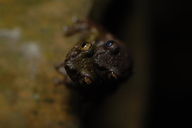|
Description
Kurixalus eiffingeri is a small and robust frog. The forelimb and hindlimb webbing is not well developed. The skin on the back of this species has tubercles and ridges. This species has 3-6 vomerine teeth. The mean snout to vent length for males is 34 mm (range 31-35) and for females it is 37 mm (range 36-40). In males, the nuptial pads are yellow and are without asperities. There is a pair of slit-like vocal openings. The species also has no dorsolateral fold, but the supratympanic fold is prominent (Maeda and Matsui 1990).
Distribution and Habitat
Country distribution from AmphibiaWeb's database: Japan, Taiwan
This species is found in both Taiwan and Japan, specifically on Ishigakijima and Iriomotejima Islands in Japan. The natural habitat is mountainous forests, especially of bamboo (Maeda and Matsui 1990).
Life History, Abundance, Activity, and Special Behaviors
Males of the Eiffinger's Tree Frog call from bamboo stumps filled with rain water (phytotelmata) to attract females during the breeding season (February to August). The mating call has notes that last 0.8 seconds with a frequency of 2.7 kHz (Maeda and Matsui 1990).
The females lay eggs above the waterline on the walls of the tree holes or stumps to be fertilized. Male frogs may guard egg sites for up to 2 weeks (ca. 10-14 days) until they hatch. Tadpoles, when hatched, will drop into the water body where they grow and develop (Lin and Kam 2008).
Selection of egg deposition sites are governed by water depths among other factors but clearly males are selective, especially given the amount of parental care required of both males and females (Lin and Kam 2008). Larva
Tadpoles are obligate oophages, fed by female frogs which lay unfertilized eggs into the water for the tadpoles to eat (Lin and Kam 2008). Comments
This species was featured in News of the Week 13 January 2025:
Amphibians are well known to lay their eggs in all sorts of interesting places: from large ponds, rivers, and streams to tiny tree holes and snail shells. Choosing a smaller, isolated place to grow up, like small water pools in tree hollows or bamboo stumps, can keep you relatively safe from competition and predators. But what do you do when you have to poop? Ito and Okada (2024) reared the Taiwanese tree frog (Kurixalus eiffingeri), in the lab and found they do not poop as tadpoles. Instead, these tadpoles keep their feces in their guts until metamorphosis when they leave their small pools of water. Additionally, K. eiffingeri is more tolerant of ammonia than three other species tested in the study. This sanitation strategy might be more widespread, but remains to be tested in other frogs and animals that are restricted to small bodies of water. (Written by Molly Womack)
References
Lin Y-S and Kam Y-C (2008). "Nest Choice and Breeding Phenology of an Arboreal-Breeding Frog, Kurixalus eifingeri (Rhacophoridae), in a Bamboo Forest." Zoological Studies, 47(2), 129-137. [link]
Maeda, N. and Matsui, M. (1990). Frogs and Toads of Japan, 2nd edition. Bun-Ichi Sogo Shuppan Co., Ltd., Tokyo, Japan.
Originally submitted by: Ambika Sopory (first posted 2000-10-16)
Edited by: Vance T. Vredenburg, Michelle S. Koo (2025-01-12)Species Account Citation: AmphibiaWeb 2025 Kurixalus eiffingeri: Eiffinger's Tree Frog <https://amphibiaweb.org/species/4367> University of California, Berkeley, CA, USA. Accessed Jan 27, 2025.
Feedback or comments about this page.
Citation: AmphibiaWeb. 2025. <https://amphibiaweb.org> University of California, Berkeley, CA, USA. Accessed 27 Jan 2025.
AmphibiaWeb's policy on data use.
|
